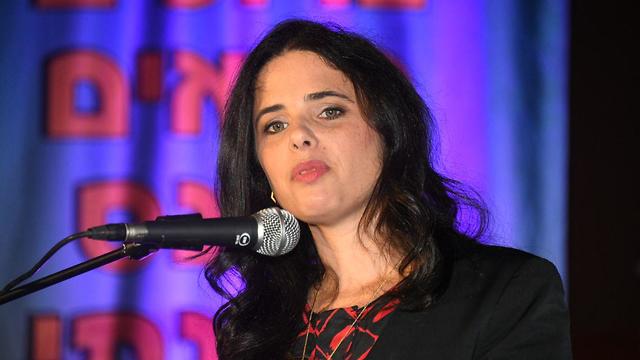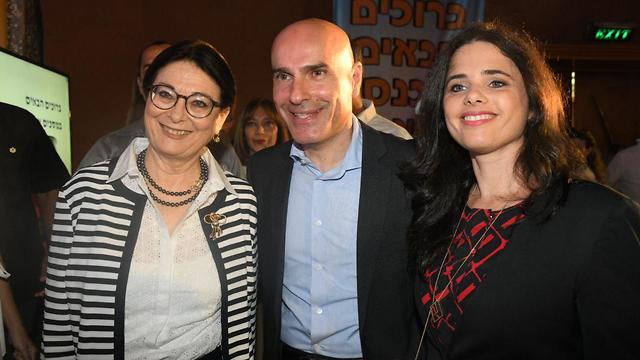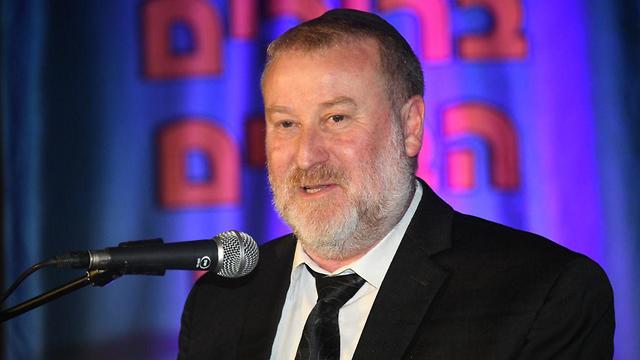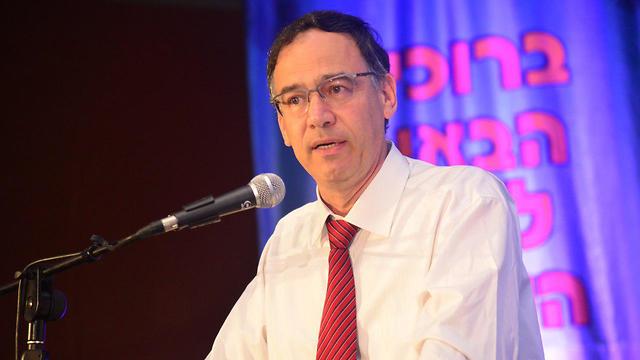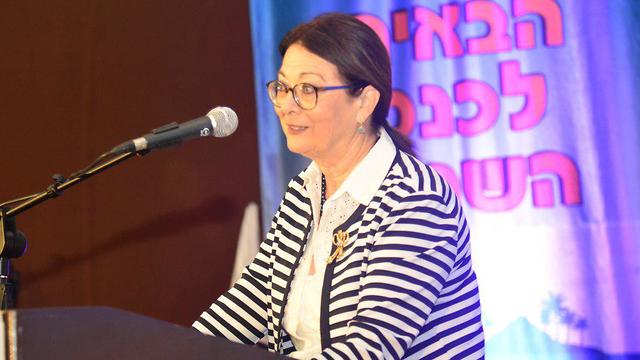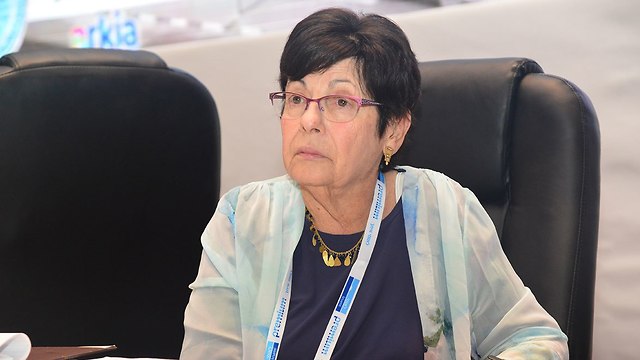
Shaked unveils criminal justice system reform bill
Pushing for rights of suspects, defendants, Justice Minister Shaked reveals reform bill that aims to preserve presumption of innocence, prevent executive branch from abusing its power; as part of reform, suspects would be allowed to record their interrogation, while media would be prohibited from photographing detainees.
Justice Minister Ayelet Shaked on Monday introduced the "fair procedure" reform aimed at reducing false convictions and fair management of a criminal investigation, as well as amending a regulation that will allow suspects to record their interrogation and the prohibition of photographing suspects in the courtroom.
"The significant disregard for the rights of suspects and defendants is a serious and ongoing failure," Shaked said at the 18th conference of the Israel Bar Association in Eilat.
"The suspect's right to dignity and liberty is often trampled under the wheels of the criminal justice system," she added. "The serious disregard for the rights of suspects and defendants is a serious and ongoing failure, stemming from years of neglect that created a vacuum, and this vacuum can no longer exist."
"The right to dignity and liberty do not exist solely when a citizen is in his best of times,” continued the justice minister. "The suspects, detainees and defendants are entitled to their rights particularly during their difficult moments, while the entire system is against them. They are entitled to their full rights even when they do not seem to be nice people and even when their innocence is questioned.
"Prosecution and the police are committed to carrying out their work in the best possible manner and we will not harm their work. Both serious and petty crimes must be dealt with," the minister said. "At the end of criminal proceedings, it is quite possible that the system will find them innocent, but until then they are often treated as common criminals. It is time for the dignity and liberty of those who are in a criminal proceeding to receive concrete, detailed and enforceable legal expression within the specific arrangements that we legislators determine."
Shaked pledged to present the “investigation procedures bill” in the coming weeks, in an effort to standardize the rights of defendants and witnesses during an investigation. The bill will establish norms regarding the place, length and language used and the recording of an investigation. It will also include the right to sleep of someone undergoing an investigation.
After the bill becomes law, Shaked intends to add clauses that would guarantee a defendant’s right to remain silent—even on non-self incriminating matters—as well as allow a defendant to record his investigation and to receive any recording, along with all the investigation materials.
The State Attorney’s Office previously ordered such changes, but they have not been enforced for eight years, according to the minister.
The bill also intends to guarantee and extend the right to an attorney, which currently applies only to one who is under arrest, but not to someone under suspicion but not actually under arrest.
Mandelblit: Justice system under attack
In his own speech, Attorney General Avichai Mandelblit said that he wants to focus on moves that aim to harm various bodies of the justice system, primarily the Supreme Court and the law enforcement system and their independence. He warned against bills coming from the coalition, saying that they "block the search for truth."
Regarding the investigation of Prime Minister Benjamin Netanyahu, he said: “We are working tirelessly on cases related to public figures. There are no shortcuts. We are dealing with human lives. The good of the investigation and of the truth trump all other considerations. When it is done, we will execute a thought out decision that will be made public.”
The attorney general said that Israel faces grave legal challenges, referring to the initiative by the UN Human Rights Council to investigate the deadly events on the Gaza border. “Prosecution authorities and courts in various countries respect the Supreme Court's decisions in the State of Israel, and therefore harm to the standing of the Supreme Court—apart from significant difficulties on the domestic level—also harms the state's ability to defend itself in international courts,” he said.
Nitzan versus Shaked
State Prosecutor Shai Nitzan responded to Shaked's speech, saying, "I loved the speech, I loved the story… In principle, most of what you say is acceptable to me. There is no doubt that the rights of defendants and of the accused must be upheld. We see this as our duty to protect the rights of victims of crime, of suspects and of defendants, but I think it is important to mention that there are victims of crime here.”
Nitzan also spoke about government corruption, mentioning the indictments submitted against ministers, the prime minister and heads of municipalities.
He expressed frustration that there is no public denunciation of convicted offenders and said that without such denunciation there cannot be change.
Nitzan compared the public attitude towards sex offenders versus corruption offenders and referred to former prime minister Ehud Olmert: "Even today, people convicted of serious public corruption are invited to television studios and conferences. Only recently, after his release from prison, an offender gave an interview while lashing out at justice authorities. Everybody was labeled with shameful epithets except for one person—he himself. Nobody stirred or made a fuss. This fact bothers me."
Hayut: Deteriorating public discourse
Supreme Court Chief Justice Esther Hayut referred to an episode in the "Uvda" television program, which dealt with the conduct of the judges at the conference: "This important conference may lead to embarrassing and inappropriate situations if we do not adhere to the rules applying to such meetings. As part of the lesson learning process, I emphasized that anyone who chooses to participate in these conferences must meet the required criteria in place. They must take proper care of our reputation as judges."
Hayut lamented the recent deterioration in public discourse in Israeli society, which she said had become crass. She blamed social networks for the trend. She said politicians are guilty, as well and many who do not exactly serve as good examples for respectful and practical discourse. She intends to have a committee examine the matter.
Strong court a national interest
Chairman of the Israel Bar Association Effi Naveh referred to various attacks on the Supreme Court. "We are at a time when the court is under the most severe attacks. Knesset members turn to attacks on the court in order to get Facebook likes," he said. "You can criticize the court, but you cannot throw out the baby with the bathwater. A strong court is a national interest of the State of Israel."
He stressed that he is not referring to Minister Shaked, to whom he referred to as one of the best justice ministers in recent years. He also expressed satisfaction that the “override power" bill has not been advanced.
Other speakers also criticized the controversial bill including former Chief Justice Miriam Naor who said that the bill came into being as a political compromise.















